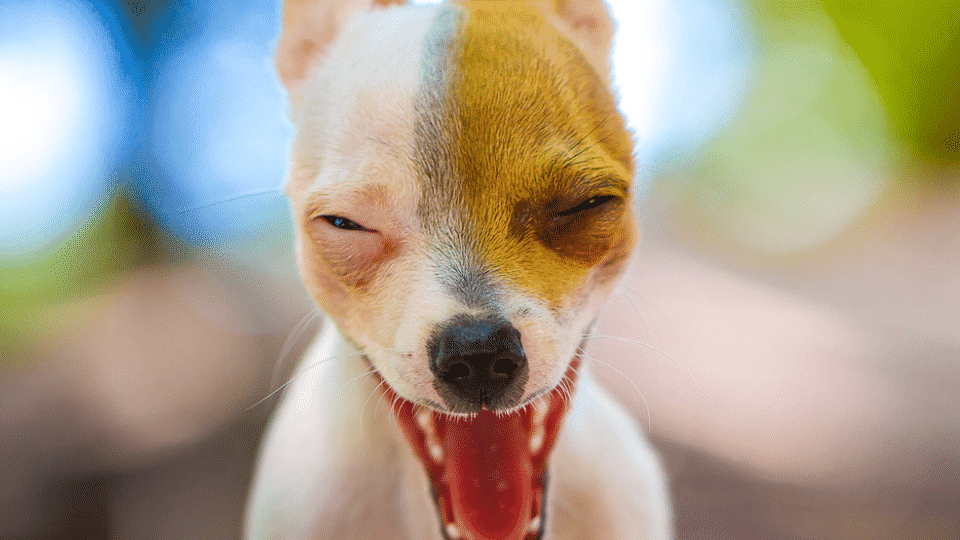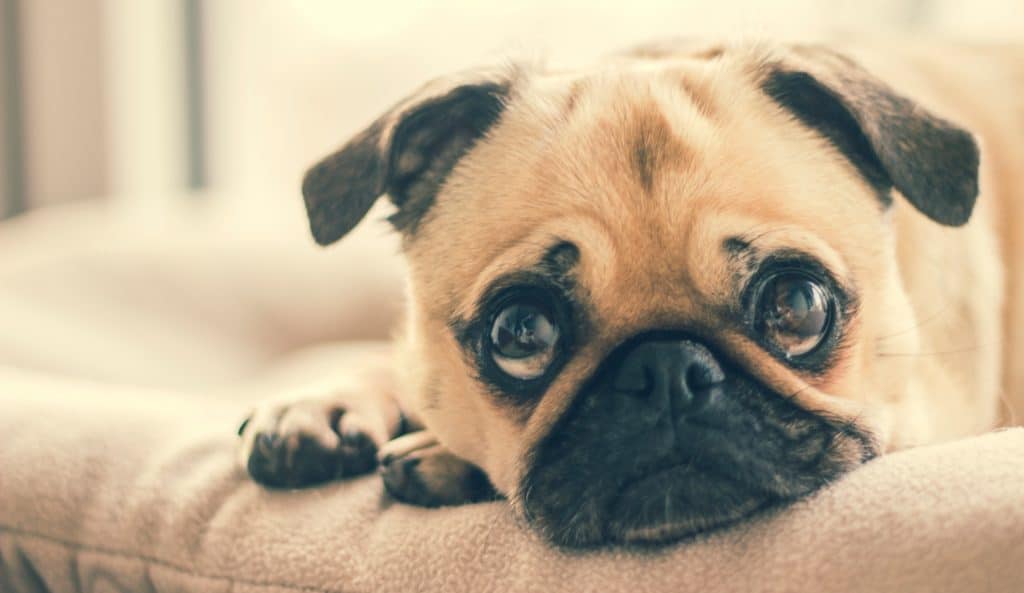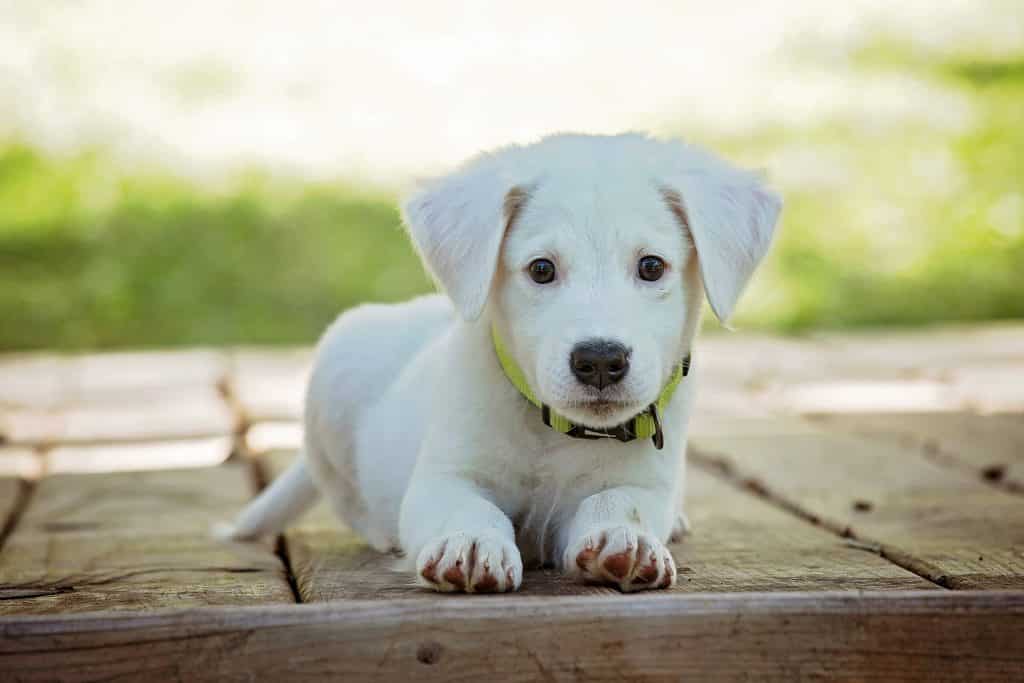Along with puppy breath, puppy hiccups are an endearing rite of puppyhood. A somber-faced puppy hiccupping after his dinner or before a nap is a common and usually short-lived event, not to mention adorable. It’s less often seen in adult dogs, but older dogs occasionally get the hiccups too.
A bout of hiccups in dogs is much the same as it is for us humans—usually just a few minutes of hiccupping and then forgotten. But when are dog hiccups are cause for concern? What if your dog or puppy seems to hiccup constantly? Read on to learn about the causes (and solutions) for a canine case of the hiccups.
What causes dog hiccups?
As in humans, in dogs, a hiccup occurs when the diaphragm is irritated. It contracts and then relaxes in a short, involuntary spasm, as opposed to the normal, smooth inhale/exhale breathing pattern.
The most common cause of hiccups with puppies and dogs is drinking water or eating food too fast, which causes the puppy or dog to ingest air along with their food or water.
General excitement and even stress can also cause a bout of hiccups in dogs. That’s true of any age dog, though it’s a less common stress reaction than lip licking or yawning.
Puppies and hiccups
But what about puppies? Why does it seem like puppies get the hiccups so much more often than dogs at other life stages?
The veterinary community has different explanations for this. In addition to the rapid eating and drinking puppies often engage in, it’s thought that energetic play is a major reason for puppy hiccups.
That’s because when a dog is playing hard, their attendant rapid breathing pattern can become a hiccup trigger. Hence, hyperactive puppies that are constantly running and jumping are more likely to get hiccups than a calm puppy or any older dogs.
How to relieve your dog’s hiccups
The vast majority of the time, hiccups are no cause for concern in dogs and puppies. In fact, we’d venture to say they’re pretty darn cute (see evidence here).
Pet owners can help their dog get over the hiccups using many of the same cures used by humans. It’s true! Among the most common natural home remedies for a bad case of the hiccups in dogs is giving a small spoonful of honey, karo syrup, or maple syrup.
All of these syrups can help to simply coat your dog’s throat and soothe any irritation, as well as help to distract them and slow down the breathing process. If you don’t have any on hand, try giving your hiccuping dog a small sip of water.
Other hiccup remedies for dogs include:
- massaging the dog’s chest
- going on a mellow, quiet walk
In both cases, the motion can help to get your dog’s breathing pattern back to a normal, calm rhythm.
To prevent frequent hiccuping in dogs and puppies, slow down their eating and drinking if possible. Slow feeding dishes for dogs are very helpful if you have a “gulper,” and what’s more, they add an element of enrichment to mealtime.
When hiccups become a dog health concern
In rare cases, frequently occurring bouts of hiccups in adult dogs, especially if they last more than 60 minutes and are seen with other symptoms, could be a sign that something isn’t quite right, and a vet should be consulted.
Regular, prolonged hiccupping episodes in tandem with breathing issues of any kind should be treated seriously. These include coughing, sneezing, reverse sneezing, and heavy breathing that’s not been caused by exercise. Pneumonia or asthma or other conditions such as pericarditis are conditions to rule out.
You might see a dog with exercise intolerance (i.e. tires quickly, even with a mild walk) and heavy breathing having issues with repeated hiccups. In this case, you should call your vet to check for an underlying medical condition.
Overexertion, especially on hot days, could also trigger hiccups. Heat stroke is a serious, life-threatening condition any dog can experience, but dark-coated dogs, or brachycephalic dog breeds such as English bulldogs, French bulldogs, and Chinese pugs, to name a few, are especially susceptible to this, due to their shorter muzzles and restricted airways.
Another concern is prolonged hiccupping in tandem with gastrointestinal symptoms such as constipation or diarrhoea, but especially vomiting and/or loss of appetite. Call your vet, or the ER vet, if you see these symptoms. Parasites could be an issue as well, especially with exercise intolerance or overall lethargy and regular hiccupping episodes.
Normal hiccups
Watching your dog’s behaviour and paying attention to physical symptoms is part of being a good pet owner, but, just as with humans, hiccups in dogs are usually nothing to worry about. And especially in puppies, hiccups are common and can even be a cute occurrence you see in your growing dog.
As well as providing fascinating facts and adorable tales, Rover.com also has a lot of wonderful dog walkers and sitters who offer dog boarding throughout the country! So next time you need a dog lover to take care of your little angel, look no further!
_
Featured photo via Charlie Stinchcomb / Flickr






